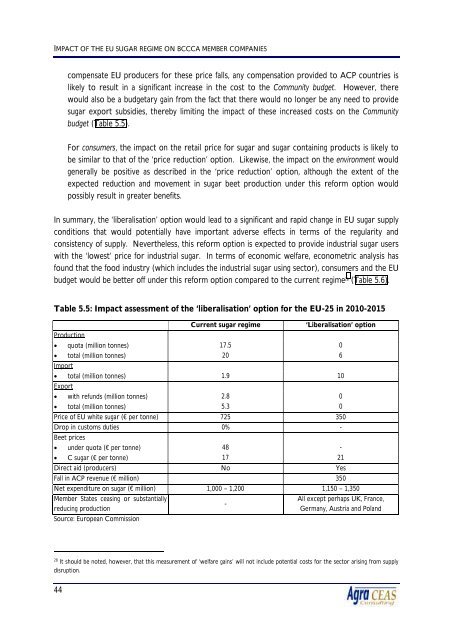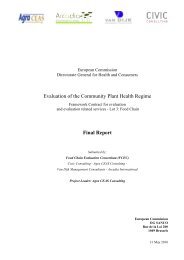2205 final report.pdf - Agra CEAS Consulting
2205 final report.pdf - Agra CEAS Consulting
2205 final report.pdf - Agra CEAS Consulting
Create successful ePaper yourself
Turn your PDF publications into a flip-book with our unique Google optimized e-Paper software.
IMPACT OF THE EU SUGAR REGIME ON BCCCA MEMBER COMPANIES<br />
compensate EU producers for these price falls, any compensation provided to ACP countries is<br />
likely to result in a significant increase in the cost to the Community budget. However, there<br />
would also be a budgetary gain from the fact that there would no longer be any need to provide<br />
sugar export subsidies, thereby limiting the impact of these increased costs on the Community<br />
budget (Table 5.5).<br />
For consumers, the impact on the retail price for sugar and sugar containing products is likely to<br />
be similar to that of the ‘price reduction’ option. Likewise, the impact on the environment would<br />
generally be positive as described in the ‘price reduction’ option, although the extent of the<br />
expected reduction and movement in sugar beet production under this reform option would<br />
possibly result in greater benefits.<br />
In summary, the ‘liberalisation’ option would lead to a significant and rapid change in EU sugar supply<br />
conditions that would potentially have important adverse effects in terms of the regularity and<br />
consistency of supply. Nevertheless, this reform option is expected to provide industrial sugar users<br />
with the ‘lowest’ price for industrial sugar. In terms of economic welfare, econometric analysis has<br />
found that the food industry (which includes the industrial sugar using sector), consumers and the EU<br />
budget would be better off under this reform option compared to the current regime 28 (Table 5.6).<br />
Table 5.5: Impact assessment of the ‘liberalisation’ option for the EU-25 in 2010-2015<br />
Production<br />
Current sugar regime<br />
‘Liberalisation’ option<br />
• quota (million tonnes) 17.5 0<br />
• total (million tonnes) 20 6<br />
Import<br />
• total (million tonnes) 1.9 10<br />
Export<br />
• with refunds (million tonnes) 2.8 0<br />
• total (million tonnes) 5.3 0<br />
Price of EU white sugar (€ per tonne) 725 350<br />
Drop in customs duties 0% -<br />
Beet prices<br />
• under quota (€ per tonne) 48 -<br />
• C sugar (€ per tonne) 17 21<br />
Direct aid (producers) No Yes<br />
Fall in ACP revenue (€ million) 350<br />
Net expenditure on sugar (€ million) 1,000 – 1,200 1,150 – 1,350<br />
Member States ceasing or substantially<br />
reducing production<br />
Source: European Commission<br />
-<br />
All except perhaps UK, France,<br />
Germany, Austria and Poland<br />
28<br />
It should be noted, however, that this measurement of ‘welfare gains’ will not include potential costs for the sector arising from supply<br />
disruption.<br />
44













